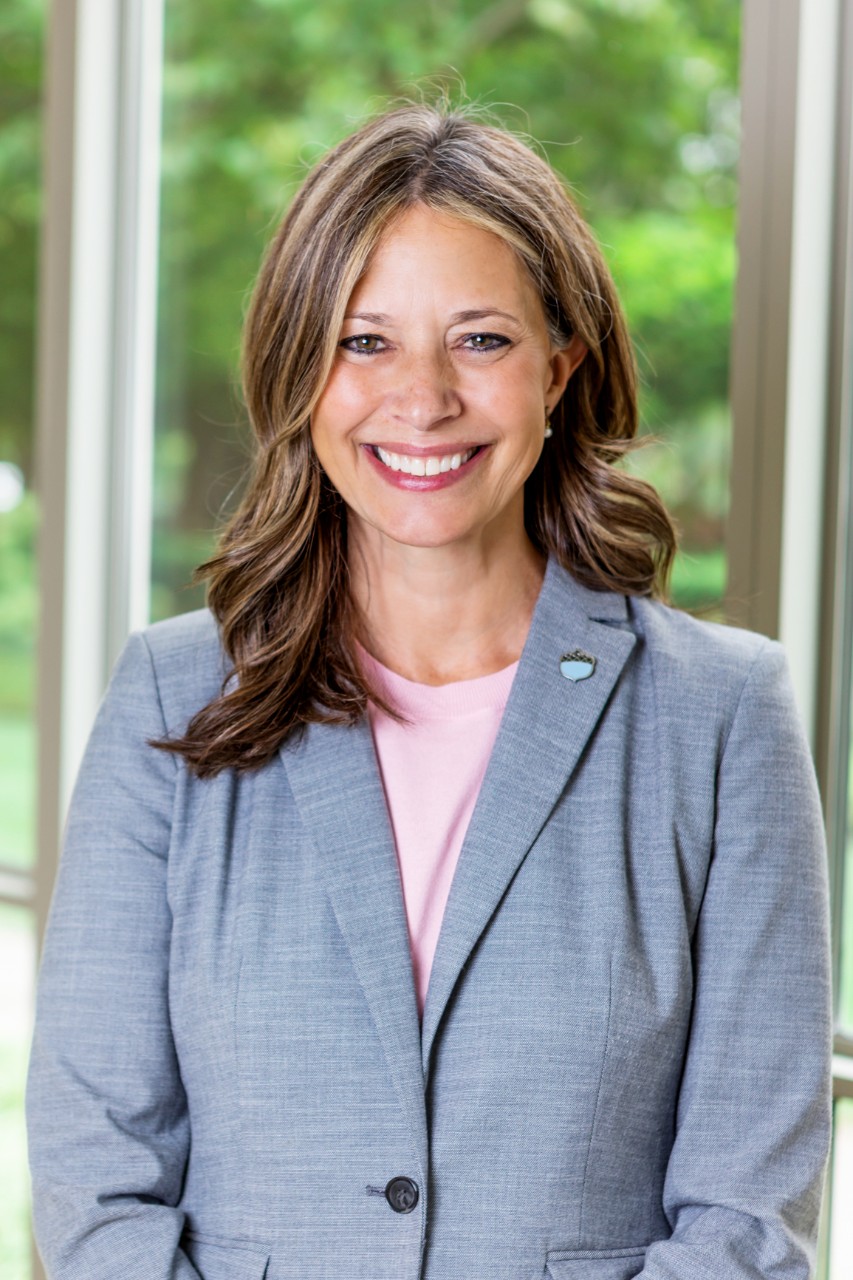
UC hosts expert symposium on COVID-19, now and then
New book inspires conversation, analysis of Ohio pandemic response
The University of Cincinnati will host a symposium on the state’s response to the pandemic titled "Ohio Under COVID: Lessons from America’s Heartland in Crisis." The event will feature Dr. Amy Acton, former director of the Ohio Department of Health, and authors and editors of the new book of the same title.

Dr. Amy Acton, speaker and former director of the Ohio Department of Health
The symposium is free and open to the public, and will be held at 3 p.m. Sept. 22 in the Annie Laws Room, 407 Teachers College, 2601 University Circle, on UC’s Uptown campus.
Panel discussions will cover the impact of COVID-19 on marginalized communities, ableism, food insecurity, prisons, access to health care and the need for more Black doctors. It will conclude with reflections from Dr. Acton, who served under Governor Mike DeWine during the height of the crisis.
A timely look at Covid
As the federal government officially lifted its public health emergency last May, the pandemic’s chapter seemed to have closed, or at least subsided.
But social and financial fallout continues. With federal subsidies discontinued, Ohio food banks report a surge in demand, according to ABC news. And with federal pandemic-related eviction bans lifted, rates are climbing, with Princeton University’s Eviction Lab finding filings have climbed nationally 50% or more compared to pre-pandemic rates.
“For some people, the end of the public health emergency marks the end of protections that were keeping them afloat, such as funding streams to states to bolster home care, or provisions that kept people from getting kicked off Medicaid,” says Vanessa Carbonell, associate professor of philosophy and co-editor of the book.
In March, continuous Medicaid enrollment in Ohio expired, resulting in a predicted 280,00 Ohioans losing health care coverage. And this month, the Food and Drug Administration released the latest Covid vaccines, as cases begin to rise again.
“So even while the virus itself is having less impact on people’s lives, there are scars left behind and ongoing challenges,” says associate professor of history Katherine Sorrels, co-editor of the collection.
The book that inspired the symposium

UC associate professor of history and co-editor of Ohio Under Covid Katherine Sorrels
Published in May by the University of Michigan Press, "Ohio Under COVID" is a curated compilation of essays, observations and research, revealing state governmental action—and reaction—to the crisis in which 18,000 Ohioans died in the first year, and shutdowns gripped the state.
The text provides a retrospective of the state’s reaction to the crisis, and serves as a platform for considering the strengths and weaknesses of the response.
“The first-person narratives capture the pandemic’s impact on individuals grappling with a wide range of challenges,” says Sorrels.
“The research articles explain how state-wide predicaments contributed to the problems faced by individuals. And the introduction shows how these challenges influenced Ohio’s early response to the pandemic, while also foreshadowing the tensions that would come to dominate the national response to Covid,” she says.
Interdisciplinary approach

Cover of Ohio Under Covid, with art by Ohio-based Yani Sheng, from her series of portraits of masked Ohio residents.
The book is an interdisciplinary effort by the college, with editors representing six academic departments: history, philosophy, sociology, English, Africana Studies, and Women’s, Gender, and Sexuality Studies. The team of editors worked together through a research group sponsored by UC’s Taft Research Center.
With contributions from more than 40 scholars and practitioners, including UC students and faculty, and several first-person reflections, the book is freely available on an open-access platform here.
“The book really illustrates the importance of attending carefully to the experiences and perspectives of individuals,” says Carbonell.
“Readers will be moved by the first-person narratives from people who experienced the pandemic working in a school or intensive care unit, or who were living in a correctional institution at the time or whose loved ones were in the hospital suffering from the virus.
“There’s no substitute for seeing how things play out in real people’s lives, and for hearing them describe their experiences in their own words.”
For more information on the event, please visit the website here.
Featured image at top: Hand holding Covid vaccine. Credit/Spencer Davis for Unsplash.
Related Stories
Mural by UC grad honors U.S. military history
July 17, 2024
Local 12 highlighted a new mural by University of Cincinnati graduate and artist Brandon Hawkins that pays tribute to U.S. military history.
Social media fuels extreme political rhetoric
July 17, 2024
UC College of Arts and Sciences Professor Jeffrey Blevins tells Local 12 that online algorithms fuel political polarization on social media.
NIS program opens new horizons for international student
July 17, 2024
In his pursuit of physics and a taste for research, Akash Khanikor ventured from his hometown in India's Assam to the University of Cincinnati, drawn by the promise of hands-on exploration early in his undergraduate career as a NEXT Innovation Scholar.
UC archivist explores Troy’s invisible workers
July 17, 2024
UC Classics archivist Jeff Kramer examined the unheralded and largely uncredited role laborers played in the 1930s excavation at Troy in Turkey.
Presidential challenge to UC: Join Ride Cincinnati to fight cancer
July 16, 2024
UC President Neville Pinto has again challenged every UC college and unit to send at least one rider to the September 14 Ride Cincinnati event to help fundraise for cancer research and cancer care. UC students ride free. Signup by July 31 for free UC-branded cycling jersey.
Exploring parallels between Biden, Reagan in second-term campaigns
July 15, 2024
UC Professor Brian Calfano explains to Spectrum News how President Reagan overcame criticism related to his age to win a second term.
New Carnegie classification focuses on leadership
July 15, 2024
Inside Higher Ed features the new Carnegie Elective Classification for Leadership for Public Purpose. The University of Cincinnati is among 25 schools with the designation. .Institutions in this classification are trying to take deliberate steps to foster leadership across campus that transcends parties and political positions and aligns with the well-being of society.
Former UC rowing coach champions mentorship over medals philosophy
July 12, 2024
Two-time University of Cincinnati graduate Brent Figg has coached rowing teams for decades — now, he’s bringing his innovative mentorship style into transdisciplinary realms.
Laboratory safety symposium coming to UC
July 12, 2024
The University of Cincinnati’s College of Arts and Sciences is partnering with the Lab Safety Institute to offer the Safer Science Summit July 22-26. The three-day STEAM Safer Science Summit will of educators and administrators K-12 an opportunity to keep up with the latest on chemical management, laboratory safety, regulatory compliance, hazard identification, legal aspects of safety and much more. Chemistry professor and A&S dean James Mack says the partnership and summit are designed to offer STEAM educators instruction and education about keeping students safe while they perform experiments. “Safety is always first,” Mack says. “We want to make sure our K-12 teachers have the equipment they need to be safe. People can get cut, or lose their sight, and spills can happen, especially when you’re dealing with chemicals.” The Laboratory Safety Institute, a non-profit educational institute, has been providing safety courses and consulting for chemical labs worldwide for the last 40 years. Its courses have been taught to more than 100,000 people in 30 countries, across industries from high-tech to government, and academia to medicine. The event is free, and educators who enroll can receive continuing education credits. Sign up here.
UC biologist documents ecological disaster one bird at a time
July 10, 2024
UC ornithologist Ronald Canterbury has been banding birds for more than 35 years. His research is helping to document the decline of species in the United States.
